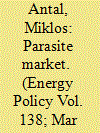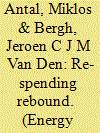| Srl | Item |
| 1 |
ID:
171487


|
|
|
|
|
| Summary/Abstract |
This article is about energy price comparison websites (PCWs). Using the example of Great Britain, it studies whether a competitive market of energy PCWs or a single non-commercial PCW can serve consumers better. Results are unambiguous. Households currently pay more than £100 million per year through their energy bills to commercial energy PCWs. The business model of these PCWs is largely based on creating deviations from consumer choice considered ideal by the regulator. As a result, people overpay for energy and retail market competition is adversely affected. Furthermore, commercial PCWs do not efficiently increase consumer engagement, so more households are on expensive tariffs than in the alternative system. Commercial PCWs also introduce a number of risks. As trade-offs in the competitive case are unavoidable, regulatory changes cannot make the market better than the one-non-profit-site solution. A single non-commercial PCW, such as the one operated by Citizens Advice, can provide a higher quality service at a substantially lower cost. Therefore, the interests of consumers can best be protected by shutting down commercial PCWs. A theoretical insight is that a competitive market of PCWs emerges if not explicitly prohibited by regulation, but reduces consumer welfare: this should be considered a “parasite market”.
|
|
|
|
|
|
|
|
|
|
|
|
|
|
|
|
| 2 |
ID:
133306


|
|
|
|
|
| Publication |
2014.
|
| Summary/Abstract |
It is well-known that energy conservation can lead to rebound effects that partly offset the original energy savings. One particular rebound mechanism is re-spending of money savings associated with energy savings on energy intensive goods or services. We calculate the average magnitude of this "re-spending rebound" for different fuels and countries, and for both energy and carbon (CO2) emissions. We find that emerging economies, neglected in past studies, typically have larger rebounds than OECD countries. Since such economies play an increasingly important role in the global economy the re-spending rebound is a growing concern. The re-spending effect is generally larger for gasoline than for natural gas and electricity. Paradoxically, stronger financial incentives to conserve energy tend to increase the rebound. This suggests that with climate regulation and peak oil the re-spending rebound may become more important. We discuss the policy implications of our findings.
|
|
|
|
|
|
|
|
|
|
|
|
|
|
|
|